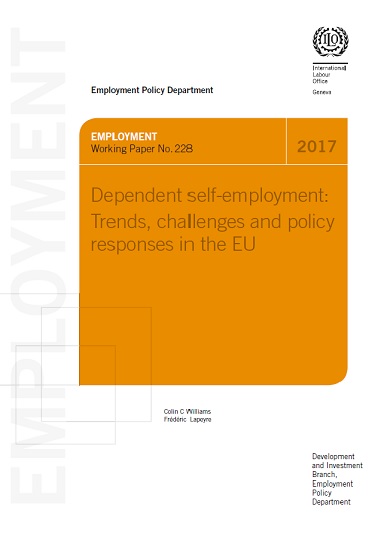Publications on non-standard forms of employment
-
Conditions of Work and Employment Series No. 94
Organizing On-Demand: Representation, Voice, and Collective Bargaining in the Gig Economy
29 March 2018
-
Conditions of Work and Employment Series No. 99
Unstable and On-Call Work Schedules in the United States and Canada
01 March 2018
-
Issue Briefs
No.5 Job quality in the platform economy
20 February 2018
This Issue Brief summarizes some of the existing empirical literature on job quality in the platform economy, particularly crowdworking platforms, drawing upon ILO surveys of crowdworkers and the existing literature.
-
Publication
Promoting adequate social protection and social security coverage for all workers, including those in non-standard forms of employment
20 February 2018
-

Publication
Dependent self-employment: Trends, challenges and policy responses in the EU
13 December 2017
EMPLOYMENT Working Paper No. 228
-
Conditions of Work and Employment Series No. 88
Mapping employment dismissal law: a leximetric investigation of EPL stringency and regulatory style
30 November 2017
-
Conditions of Work and Employment Series No. 91
Managing social risks of non-standard employment in Europe
11 October 2017
-
INWORK Policy Brief No. 10
Purchasing practices and working conditions in global supply chains: Global Survey results
09 June 2017
-
INWORK Policy Brief No. 9
Women in Non-standard Employment
31 May 2017
-
Publication
Organising and representing hard-to-organise workers: Implications for Turkey
21 May 2017
This report was prepared as a background paper for an international conference on “Organising Hard-to-Organize Groups” held in Ankara, Turkey on 8 May 2018. It was commissioned by the ILO under a project entitled “Improving Social Dialogue in Working Life”, funded by the European Union and the Government of Turkey. The report documents and analyses international experience and good practice in organizing and representing the diverse groups of “hard-to-organize” workers. While, by definition, serious challenges are encountered by trade unions in reaching and organizing workers in the informal economy, the self-employed, undeclared, agency and platform workers, there is an increasing number of positive experiences in doing so, which can be of interest for many institutions and persons working in this field.